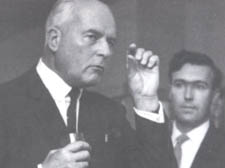|
|
 |
| |

Ian Norrie, right, pictured with Sir Allen Lane |
The shelf life of bookman, Norrie
High Hill publisher Ian Norrie’s autobiography recalls an era in the literary history of Hampstead that may have been lost forever, writes Gerald Isaaman
The Business of Lunch: A Bookman’s Life and Travels.
By Ian Norrie. Quartet
THE first time I met Ian Norrie, Hampstead bookseller supreme and publishing world guru, he said: “I thought you were some slick car salesman from Rowland Smith’s across the road.”
That, no doubt, was because my Soho tailor friend made me smart suits, paid for by time spent working shifts in Fleet Street.
Ian was never an arch exponent of how to win friends and influence people, and still insults people, once telling Jonathan Miller, as he handed over a copy of Racine’s Andromaque: “I suppose that’s the next classic you’re going to mess about with!”
Yet, ironically, he derides those who are just as blatantly rude. His sardonic wit is one of his endearing qualities you get used to, even enjoy, particularly now since he flatters me so in his seductive memoirs, published at the age of 81.
Familiarity has, undoubtedly, not bred contempt after more than half a century of friendship in the parallel decades we enjoyed in Hampstead Village, he filling that once famously familiar spot on the High Street where the High Hill Bookshop reigned for 32 years, and I rising from young reporter to editor of the Ham & High for 25 of them.
It seems almost as if our lives – and passion for the hilltop village – were forever inter-twined reading his intriguing personal saga of a warm and welcoming age now lost. That was when Hampstead was littered with literary people – and others – of ascending talent and promise, who enhanced our careers with total fascination.
It was a kind of growing-up process, being at the heart of the community we served in different ways, one where like-minded ideals were positively pursued and new ideas fashioned – so unlike the current negative age of scorn and derision that engulfs us.
For me, Ian’s inspiring story produces that kind of lightning flash of your life paraded before you seconds before your demise, except that, fortunately for us both, we are still here. And Ian, admirable raconteur of times past, is now master of the round table at the Garrick, where a handful of us meet up for lunch most Mondays, to put the world to rights. Lunch, as the title of Ian’s memoir suggests, being the imperative way he spends his best days.
There’s a cast of famous names running through the pages of Ian’s story, of the lad who began life as an unpaid trainee reporter on the Eastbourne Gazette and Herald, developed an abiding love of the theatre, cricket and foreign travel, as well as French wine. Elias Canetti, Margaret Drabble, John Mortimer, Michael Foot, Olivia Manning, John le Carré, Kingsley Amis, Judi Dench, Michael Palin, John Hillaby, Christopher Wade – and the wine-flowing parties Ian held to launch local author’s books – will give you a clue.
Initially, he commanded the High Hill and its publishing arm without knowing the identity of its mystery proprietor, who had bought it as a tax loss. We all thought it to be the Penguin genius Sir Allen Lane, while it turned out to be the remarkable Christina Foyle, for whom Ian had earlier worked in Charing Cross Road – Ian declaring he would have walked out if he had known the truth.
Like a true maverick, he confesses that he had no training for what he ended up doing so magnificently in creating one of London’s legendary bookshops. He admits he inherited his pharmacist father’s impatience and healthy scepticism, but without openly revealing his generosity to those he cares for and admires, his supportive late wife, Mavis, especially, and his loyal oddball staff of terrifically diverse talents.
Moreover, Hampstead’s history – and that of other noted London enclaves – has given us the legacy of The Book of Hampstead and the Heathside Book, two anthologies he created and edited, that remain delightful reminders of the past, alongside Ian’s celebrated tomes on the publishing industry.
Inevitably, I have a different perspective on some of the events he recalls. The New Hampstead Society, for instance, being given birth by architects Christopher Gotch and Michael Floyd intent on persuading the old Hampstead Council to build a modern new town hall complex at Swiss Cottage, rather than taking umbrage over Peggy Jay’s days reigning over the Heath and Hampstead Society.
Likewise, he claims that the first season of Jimmy Roose-Evans’ Hampstead Theatre Club was “not markedly successful”, when in fact the unknown Harold Pinter’s double bill transferred to the West End, making his name – and Hampstead’s too as the home of avant garde drama, going back to the Everyman’s Noel Coward heyday.
Ian played his part by offering the High Hill as the theatre’s box office, a typical act of genuine support, that has, equally, made his name as a benefactor to Hampstead’s cultural and social life.
It’s about time there was an illustrious plaque to him, if space can be found on the wall of Gap, the store that ignominiously, as in so many commonplace High Streets nowadays, replaces the unique and highly independent High Hill Bookshop.
His memoir – with its Sydney Arrobus watercolour on the front cover – truly extols better times past.
•
|
 |
|
 |
 |
|
 |
|


